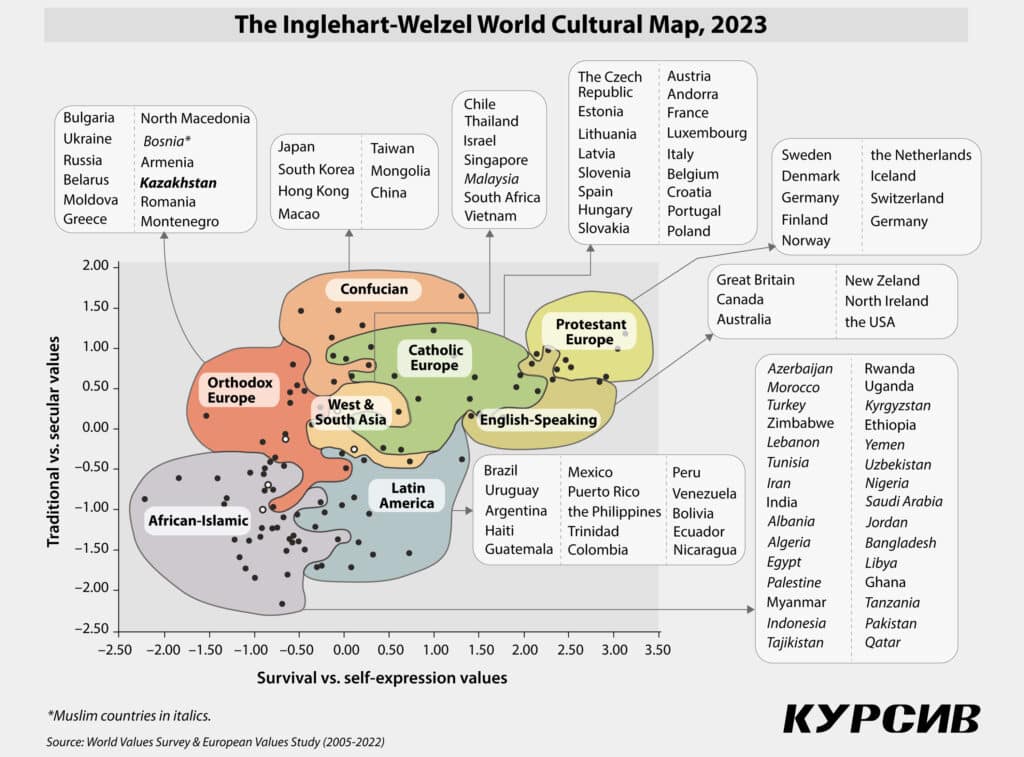
Our earlier reports highlighted that the consumer confidence index (CCI) is sensitive to how the population responds to economic and social upheavals, as well as to their media consumption and the socio-demographic makeup of those participating in consumer sentiment studies. However, we have barely addressed why some countries tend to display consumer pessimism, while others lean toward optimism.
Modernization of society
Globalization and modernization can lead to strikingly different outcomes in countries with varied levels of economic and physical security. Researchers observe that economic development, combined with technological modernization, significantly impacts the social fabric of communities. Countries with high levels of modernization also experience shifts in societal values, including a move toward more egalitarian social structures and greater tolerance for cultural, ethnic and religious diversity.
The cultural evolution and post-materialism theory, developed by Ronald Inglehart, proposes a shift from materialistic values — such as economic growth and wealth accumulation — toward post-materialistic values, like freedom, egalitarianism and tolerance. The World Values Survey, which encompasses 120 countries and 94.5% of the global population, positions participating countries on a diagram with two key dimensions: «survival values versus self-expression values» and «traditional values versus secular-rational values.»
Value dimensions
How is a country’s position on the value map determined? Every five years, a representative sample of the population in each participating country answers questions about their engagement in civil and political life, attitudes toward religion, government, human rights and related topics. Based on these responses, key indicators are calculated to place each country along two value dimensions: «survival values vs. self-expression values» and «traditional values vs. secular-rational values.»
The survival vs. self-expression dimension reflects a population’s priorities. Survival values emphasize physical security, material stability and low tolerance for dissent. Conversely, self-expression values focus on human rights, personal freedoms, professional growth and tolerance. The traditional vs. secular-rational dimension similarly represents societal values. Traditional values emphasize collectivism, religious devotion, a focus on family and respect for authority. In contrast, secular-rational values are associated with individualism, a reduced role for religion in both daily life and governance and a more rational, scientific perspective. A country’s position on these two dimensions determines its place on the value map.
However, commitment to self-expression values doesn’t always correlate with a strong adherence to secular-rational values. For example, Russia and other post-Soviet countries display high levels of individualism and rationalism but also emphasize material security and stability. The U.S., by contrast, strongly values human rights and freedoms, professional growth and tolerance, yet also upholds religious, family-oriented and socially conformist values.

Cultural profile and CCI
Research suggests that consumer confidence indicators are influenced by a country’s cultural context, which shapes how consumers perceive their nation’s economy and personal financial circumstances. Cultural profiles may help explain the significant variation in CCI scores, GDP levels and other macroeconomic indicators across countries.
Consumers from different cultural backgrounds may interpret identical economic conditions in contrasting ways. Household behavior is influenced by cognitive biases, psychological prejudices, groupthink and social norms, all of which are deeply embedded in a country’s dominant culture.
Analyzing culture and consumption
Using an interdisciplinary approach that combines cultural studies with macroeconomic analysis, researchers examined CCI scores in 37 countries with diverse value profiles.
The survey results indicate that the value of self-expression (as opposed to survival) is positively correlated with changes in the CCI. In cultures that emphasize freedom and self-expression, people tend to remain more optimistic about the economy, even during economic turmoil. In these countries, the decline in CCI during downturns was less severe compared to nations where survival-oriented values dominate.
Conversely, individualism vs. collectivism and secularism vs. religion (tradition) are negatively related to CCI during recessions and crises. Researchers hypothesize that consumer confidence is lower in more individualistic and secular cultures during crises, whereas in more collectivistic and religious societies, people can more easily rely on their community or authorities for support and reassurance.













